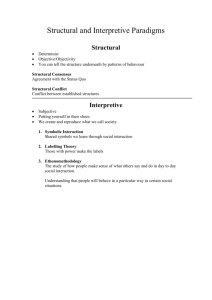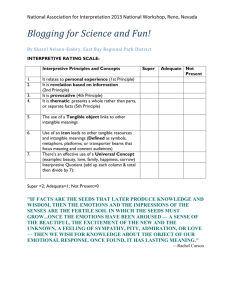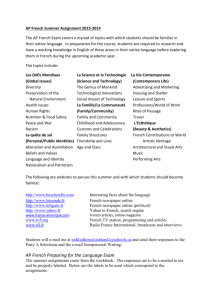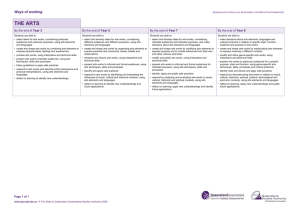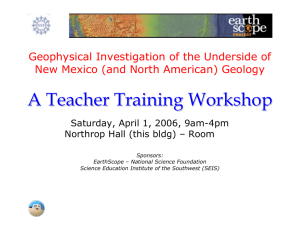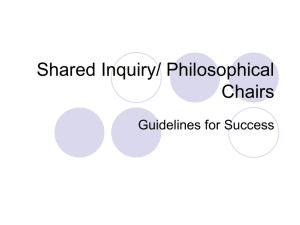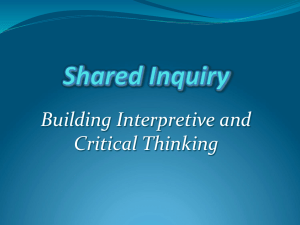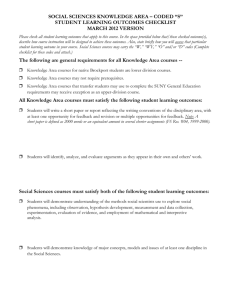Geology Interpretative Training
advertisement
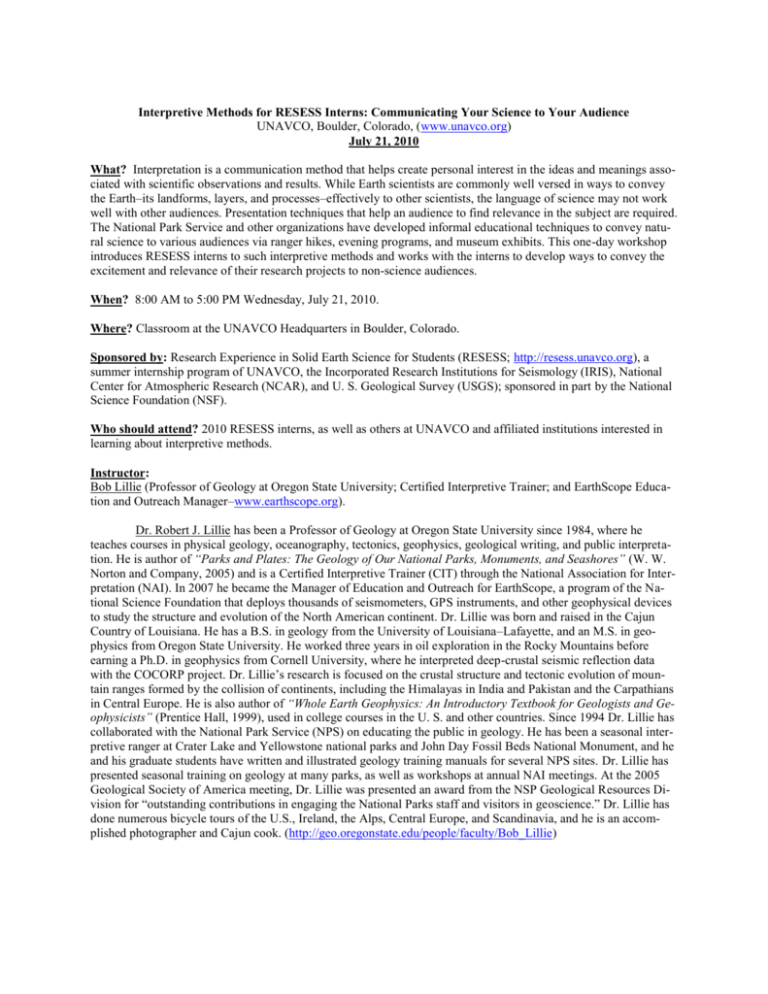
Interpretive Methods for RESESS Interns: Communicating Your Science to Your Audience UNAVCO, Boulder, Colorado, (www.unavco.org) July 21, 2010 What? Interpretation is a communication method that helps create personal interest in the ideas and meanings associated with scientific observations and results. While Earth scientists are commonly well versed in ways to convey the Earth–its landforms, layers, and processes–effectively to other scientists, the language of science may not work well with other audiences. Presentation techniques that help an audience to find relevance in the subject are required. The National Park Service and other organizations have developed informal educational techniques to convey natural science to various audiences via ranger hikes, evening programs, and museum exhibits. This one-day workshop introduces RESESS interns to such interpretive methods and works with the interns to develop ways to convey the excitement and relevance of their research projects to non-science audiences. When? 8:00 AM to 5:00 PM Wednesday, July 21, 2010. Where? Classroom at the UNAVCO Headquarters in Boulder, Colorado. Sponsored by: Research Experience in Solid Earth Science for Students (RESESS; http://resess.unavco.org), a summer internship program of UNAVCO, the Incorporated Research Institutions for Seismology (IRIS), National Center for Atmospheric Research (NCAR), and U. S. Geological Survey (USGS); sponsored in part by the National Science Foundation (NSF). Who should attend? 2010 RESESS interns, as well as others at UNAVCO and affiliated institutions interested in learning about interpretive methods. Instructor: Bob Lillie (Professor of Geology at Oregon State University; Certified Interpretive Trainer; and EarthScope Education and Outreach Manager–www.earthscope.org). Dr. Robert J. Lillie has been a Professor of Geology at Oregon State University since 1984, where he teaches courses in physical geology, oceanography, tectonics, geophysics, geological writing, and public interpretation. He is author of “Parks and Plates: The Geology of Our National Parks, Monuments, and Seashores” (W. W. Norton and Company, 2005) and is a Certified Interpretive Trainer (CIT) through the National Association for Interpretation (NAI). In 2007 he became the Manager of Education and Outreach for EarthScope, a program of the National Science Foundation that deploys thousands of seismometers, GPS instruments, and other geophysical devices to study the structure and evolution of the North American continent. Dr. Lillie was born and raised in the Cajun Country of Louisiana. He has a B.S. in geology from the University of Louisiana–Lafayette, and an M.S. in geophysics from Oregon State University. He worked three years in oil exploration in the Rocky Mountains before earning a Ph.D. in geophysics from Cornell University, where he interpreted deep-crustal seismic reflection data with the COCORP project. Dr. Lillie’s research is focused on the crustal structure and tectonic evolution of mountain ranges formed by the collision of continents, including the Himalayas in India and Pakistan and the Carpathians in Central Europe. He is also author of “Whole Earth Geophysics: An Introductory Textbook for Geologists and Geophysicists” (Prentice Hall, 1999), used in college courses in the U. S. and other countries. Since 1994 Dr. Lillie has collaborated with the National Park Service (NPS) on educating the public in geology. He has been a seasonal interpretive ranger at Crater Lake and Yellowstone national parks and John Day Fossil Beds National Monument, and he and his graduate students have written and illustrated geology training manuals for several NPS sites. Dr. Lillie has presented seasonal training on geology at many parks, as well as workshops at annual NAI meetings. At the 2005 Geological Society of America meeting, Dr. Lillie was presented an award from the NSP Geological Resources Division for “outstanding contributions in engaging the National Parks staff and visitors in geoscience.” Dr. Lillie has done numerous bicycle tours of the U.S., Ireland, the Alps, Central Europe, and Scandinavia, and he is an accomplished photographer and Cajun cook. (http://geo.oregonstate.edu/people/faculty/Bob_Lillie) 2 Agenda (Tentative) Interpretive Methods for RESESS Interns: Communicating Your Science to Your Audience _______________ Room at UNAVCO Headquarters in Boulder, Colorado Wednesday, July 21, 2010 Morning: 8:00 8:30 9:00 9:45 10:00 10:15 10:45 11:00 11:45 12:00 Continental Breakfast Workshop overview and personal introductions “Broader Impacts and Earth Science Literacy principles–Why should anyone care?” Brainstorming – What are “Big Ideas” about your research project that might be interesting and useful for the public to know? Break (coffee, tea, juice, snacks provided) “Interpretive methods: Bringing science to the public” Brainstorming – Communicating your science to your audience “Presenting your science to your audience: Tangibles, intangibles, and interpretive themes” Brainstorming – Tangible and Intangible ideas for connecting your science results to your audiences Lunch in the meeting room (provided) Afternoon: 1:00 Participants break into groups to develop elements of an interpretive presentation involving their research: - Define your topic, and designate the audience and setting for the program. - Tangibles: What scientific observations and results might be appropriate for the audience? - Intangibles: What meanings (intellectual and emotional connections) might the audience attach to the observations and results? - Theme Statement: Develop a concise sentence connecting the tangible observations/results and intangible meanings important to the audience. 2:30 Break (coffee, tea, juice, snacks provided) 2:45 Each group presents their interpretive program outline and “skit”: - Leader states title and describes setting and audience. - Group presents and discusses tangibles and intangibles, and gives theme statement. - Group presents “skit” of their interpretive program. - Participants and instructors brainstorm about interpretive methods that might be used to convey messages contained in the group’s theme statement and skit. 4:45 Workshop wrap-up and evaluation 5:00 Adjourn Evening: 5:30 Dinner? 3 Description Interpretive Methods for RESESS Interns: Communicating Your Science to Your Audience Purpose of Workshop: The workshop will bring together the 2010 RESESS interns to brainstorm about methods to convey how their scientific research is understandable and useful to various audiences. One of the important aspects of Earth science is the integration of many types of observations to study problems important to society. Scientists should be up to the challenge of presenting complex data and related principles in language and formats accessible to varied audiences. In fact, the National Science Foundation (NSF) and other organizations require that research proposals have a “Broader Impacts” plan to disseminate the results and societal implications of the research to a variety of scientist and non-scientist audiences. The workshop will introduce RESESS interns to interpretive methods that help convey the results and deeper meanings of their research to audiences who may have little or no background in Earth or other sciences, but who can benefit intellectually, culturally, or aesthetically from the results of the research. Presentations and activities will focus on engaging audiences on not only how and why science is important, but also that it is exciting, understandable, and meaningful. During the workshop, participants will work in teams to develop themes and techniques that inspire different audiences to appreciate how and why Earth science research may be important to them. By the end of the workshop, groups will develop and present interpretive programs that provide opportunities for audiences to connect to the scientific and societal implications of specific RESESS research projects. Interpretive Program Development: Interpreters1 are communication specialists who work in parks, museums, and other informal education settings to engage visitors on the natural and cultural history of a site or region. An effective interpretive program creates opportunities for an audience to form their own intellectual and emotional connections to the meanings inherent in a resource. Participants will work in teams to incorporate their research observations and results (“resource”) into interpretive programs aimed at non-science audiences. Each group will develop the following aspects of an interpretive presentation. 1. What is the setting for the program? 2. Who is the audience? 3. What are tangibles (scientific observations/results) and intangibles (meanings/connections) that might be important to that audience? 4. What might be a theme statement for the program, that provides a link between the tangibles and intangibles and serves as a guide to program development? After each group presents their work on interpretive program development, the workshop participants and instructors will discuss and brainstorm about the following. a) Is the information (tangibles) accurate and germane? Does it include geology, geophysics, or other Earth science content that is appropriate for the intended audience? b) How effective might the meanings and connections (intangibles) be in reaching the designated audience? What are opportunities for intellectual connections? For emotional connections? The term “informal educator” is commonly used in museums, while parks typically use “interpreter.” Other terms such as “resource educator” are used by various organizations. The term “interpreter” in this document is meant to encompass all the professionals who engage the public in informal education. 1 4 c) Would a program incorporating the stated tangible observations and intangible meanings, and focused on the group’s theme statement, create enough opportunities for the audience to be significantly more knowledgeable about the scientific problem being investigated? About the deeper meanings of the research? About Earth science in general? 5. If time permits, some groups may wish to present an actual interpretive “skit” based on their work. Earth Science Literacy Document: Many of the “Big Ideas” about Earth Science that will be discussed in the workshop are part of a document on “Earth Science Literacy” recently developed by the National Science Foundation. A copy of the brochure is in the workshop binder, and can be downloaded at www.earthscienceliteracy.org/document.html. 5 Other Information (including Internships, Employment Opportunities, and Broader Impact Ideas): National Association for Interpretation: www.interpnet.com Certified Interpretative Guide Training: www.interpnet.com/certification/index.shtml National Park Service: www.nps.gov Geological Resources Division: www.nature.nps.gov/geology Geoscientist-in-the-Parks Program: www.nature.nps.gov/geology/gip National Science Foundation: www.nsf.gov Broader Impact Ideas: www.nsf.gov/pubs/gpg/broaderimpacts.pdf EarthScope: www.earthscope.org Education and Outreach: www.earthscope.org/eno Broader Impact Ideas: www.earthscope.org/science/broader_impacts UNAVCO: www.unavco.org Education and Outreach: www.unavco.org/edu_outreach IRIS: www.iris.washington.edu Education and Outreach: www.iris.washington.edu/hq/programs/education_and_outreach Student Conservation Association: www.sca-inc.org National Center for Science Education: www.ncseweb.org Contact Information: Bob Lillie EarthScope Education and Outreach Manager Professor of Geology and Certified Interpretive Trainer Department of Geosciences Oregon State University, Wilkinson Room 104, Corvallis, OR, 97331 Phone: (541)-737-1242; Cell: (541)-231-2247; E-mail: lillier@geo.oregonstate.edu Web: http://geo.oregonstate.edu/people/faculty/Bob_Lillie Valerie Sloan Assistant Director of RESESS & Geoscience Education Specialist UNAVCO, Inc. 6350 Nautilus Dr. Boulder, CO, 80301 Phone: (303)-381-7488; Cell: (303)-517-3838; E-mail: vsloan@unavco.org Melissa Weber Administrative Assistant UNAVCO, Inc. 6350 Nautilus Dr. Boulder, CO, 80301 Phone: (303)-381-7561; E-mail: weber@unavco.org
